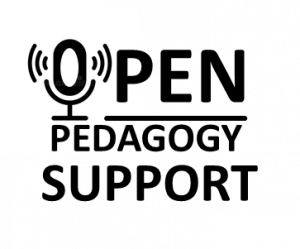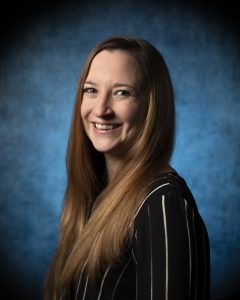Open Pedagogy Support Podcast – Episode 1
Mandi Goodsett

More and more teachers are using creative classroom assignments to help students take ownership of their learning. But when classroom assignments involve public-facing projects, what are the copyright implications? And how can students be responsibly invited to share their voices with the world? This podcast invites faculty to share how they incorporate public-facing projects (such as open pedagogy and multimodal projects) into the classroom, and how librarians and others partner with them for success.

Dr. Melanie Gagich is a Senior College Lecturer in the First-Year Writing Program at Cleveland State University where she has taught composition courses for nearly ten years. She received her PhD in Composition and Applied Linguistics from Indiana University of Pennsylvania in 2020 and earned an Effective Online Teaching Practices certification from the Association of College and University Educators (ACUE) in 2021. She has published her work in the Interactive Journal of Technology and Pedagogy and Writing Spaces with a forthcoming article appearing in Composition Forum. Her research interests include multimodal composition, digital literacy, digital rhetoric, and open access pedagogy. She served as convener of the DigitalCSU working group from 2018-2020, as a faculty champion during the 2020-2021 academic year, and as a member of the OpenCon Cleveland planning committee since 2018. She also won the inaugural Textbook Hero award with her co-author, Emilie Zickel, for the open access textbook, A Guide to Rhetoric, Genre, and Success in First-Year Writing.
In this podcast interview, Melanie discusses her discourse community open pedagogy class project, which requires students to create public-facing, multimodal composition projects using openly licensed content. Melanie also describes how the library supported her in her efforts.
Faculty Discussion/Reflection Questions:
- If you’re a composition instructor, how might multimodal composition and open pedagogy serve as tools for student engagement in your own teaching? If you aren’t a composition instructor, what pedagogical approaches in your own discipline might intersect successfully with open pedagogy?
- What are some ways instructors can help students overcome anxiety related to sharing their creative work online, using new technologies, and/or having class assignments that are less structured than expected?
- How can open pedagogy projects improve digital literacy skills?
Helpful Resources:

